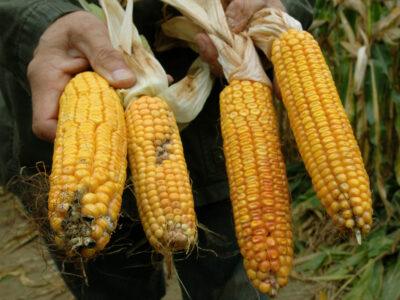|
Listen To The Article
|

Image source: NPR
GMO corn is no longer resistant to pests, Brazilian farmers say.
The growers maintain that the genetically modified corn seeds are no longer protected from “voracious tropical bugs” and therefore require enhanced use of pesticides, Reuters reported. Dow, Monsanto and other biotech companies have long contended that genetically engineered seeds produce greater yields and drastically cut down on the expense associated with applying chemical pesticides to crops.
The Brazilian farmers want the four major biotech manufacturers to reimburse them for the costs incurred due to applying three coatings of pesticides already this year.
“The caterpillars should die if they eat the corn, but since they didn’t die this year producers had to spend on average 120 reais [$54] per hectare … at a time that corn prices are terrible,” Ricardo Tomczyk, president of Aprosoja farm lobby in Mato Grosso state, told Reuters.
Farming in the “bug-ridden” tropical locale has always been a challenge, and the growers once thought GMO corn and other genetically modified seeds were going to be their salvation. Brazilian government leaders are now worried that planting the same crops each year utilizing the same “seed technologies” has left the agricultural realm far more vulnerable to both a dependency upon toxic chemicals and pest outbreaks. The southern grassworm or corn leafworm known as Spodoptera frugiperda is the primary problem facing GMO corn crown in the country.
New Survival Seed Bank™ Lets You Plant A Full Acre Crisis Garden!
The extremely destructive worm is present in the eastern and central regions of North America and in South America. Illinois corn farmers suffered through a massive leafworm infestation in 1998.
Seed companies are now warning farmers in Brazil to plant part of their corn fields using only conventional seeds, which allegedly will help prevent pest resistance, according to Scientific American. Dow Chemical Company’s Dow Agrosciences division already has programs in Brazil designed to help farmers who are using GMO seeds and battling pests.
Story continues below video
DuPont, another biotech company focused on the growth of the GMO seed and chemical pesticide industry, said it had received no “formal” complaints concerning a lack of resistance of seeds or a failure of products.
Ricardo Tomczyk, who was the voice of Brazilian farmers in a fight of Monsanto seed royalty payments last year, said seed companies are not putting the blame where it belongs.
“There are barely any non-GMO seeds available … it is very uncomfortable that the companies are blaming the farmers.”
Although Tomczyk hopes to negotiate a settlement with GMO corn seed companies, the farmers are prepared to move forward with a lawsuit to garner reparations for pesticide costs if necessary. Brazil produces about 78 million tons of corn each year. Due to a series of record-setting growing years, domestic corn prices recently hit a new low because of the abundant supply. With the combination of low prices and enhanced costs associated with the application of chemical pesticides, farmers in Brazil are facing a double whammy.
Do you believe all GMO varieties eventually will become pest resistant? Share your thoughts in the section below:
 Off The Grid News Better Ideas For Off The Grid Living
Off The Grid News Better Ideas For Off The Grid Living




